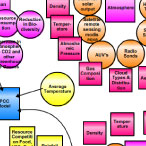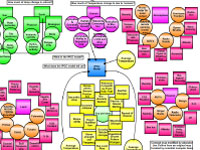Scientist Joaquim Goés explains the concept map and its development:
My original focus question was, "Do you believe in global warming and climate change?" If a student says, "yes",
then the teacher can ask them, "Who or what do you think is responsible?" I have found that people are really
interested in discussing who or what is responsible for global warming - is this change part of a natural cycle
or is it human-influenced - or both? However, responsibility for global warming is a completely different
discussion than learning about the observational data we have collected all over the earth that tells us about
the process of global warming. So, we will save the "responsibility discussion" for later, and focus on factors
that we know scientifically can influence global warming.
For natural earth-sun cycles that affect global warming, there are three concepts to understand: distance of the
earth from the sun, tilt of the earth axis, and shape of the earth's orbit around the sun. These processes can
cause climate change, and have in the past, but they are very predictable over long-time periods. Right now in
earth history, we believe that human influences play a much larger role in global warming.
When discussing human influences on global warming, you must consider the effects of human use of fossil fuels
to power cars, industries, and to meet our daily energy needs. Because of these activities, there has been -- and
continues to be -- a massive increase of greenhouse gases to the atmosphere. This has resulted in the warming of
the atmosphere as more heat is 'trapped' and not released back into space after it warms the earth. Carbon dioxide,
released when fossil fuels are burned, is the major greenhouse gas. Increases in the human population,
deforestation, and agricultural practices have also contributed to the process of global warming. (This is a
good point to tie into Helga's map about carbon dioxide's effect on the heating of the earth and ocean.)
I wanted to highlight 'signs of climate change', denoted by the circle of concepts around "Earth" on my map.
Some of these signs include drought, forest fires, acidification of the ocean, extreme rainfall events,
icecaps & glaciers melting, sea level rise, etc. I have connected all these concepts back to "Humans" as
they have direct and often dire consequences on life. Some people link climate change to decreases in global
human health and the availability of natural resources (water, oil, food, for instance). I emphasize in my map
that we must put great effort into learning more about climate change and the potential ways can mitigate its
effects on earth's ecosystems.
My team of educators was very interested in teaching their students that scientists are able to collect data
that inform them about the process of climate change. They wanted their students to learn about the plethora
of sensors and instruments we currently use to measure climate change. This was a very different approach than
I took with my first concept map -- in which I focused on the process of global warming -- but found it
interesting that sensors and new technologies could be a "hook" for students to learn more about global
warming.
|













